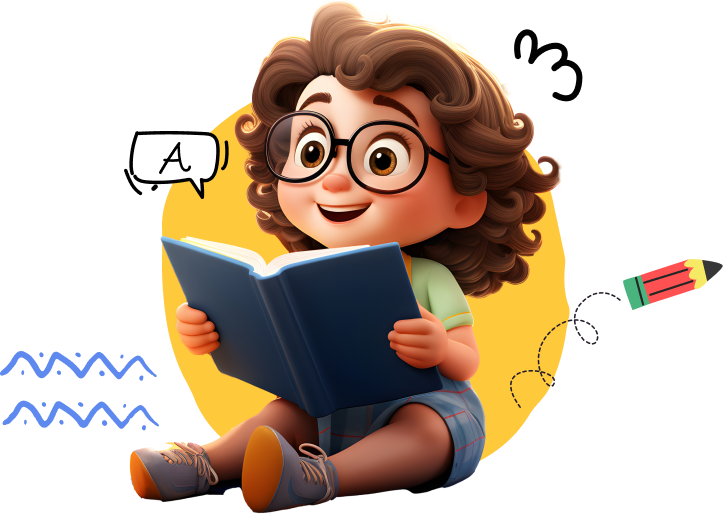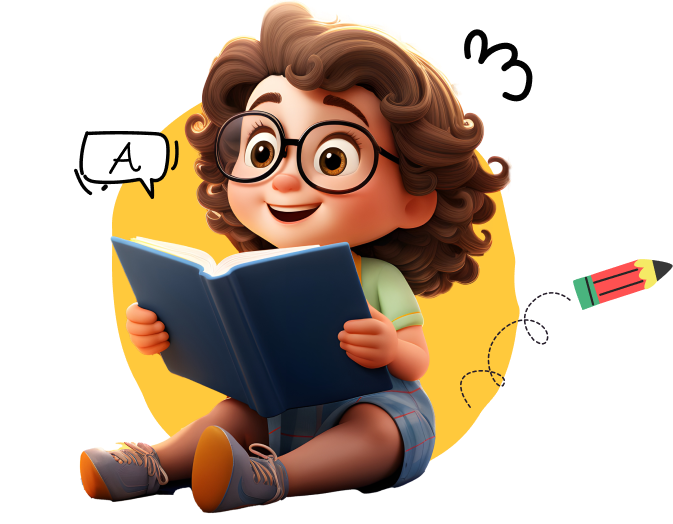Curriculum 
Ignite your child's passion for English with our innovative curriculum that combines Task-Based and Project-Based Learning for real-world application!
Syllabus 

Introduction to KET
What students will learn:
- Overview of KET exam format and components
- Vocabulary: Basic personal information (name, age, country)
- Activities: Icebreaker games to practice introductions
- Writing: Creating a personal profile
Daily Routines
What students will learn:
- Vocabulary: Daily activities (wake up, eat breakfast)
- Activities: Sharing daily routines with classmates
- Reading: Simple texts about routines
- Writing: Writing about their daily schedule
Food and Drink
What students will learn:
- Vocabulary: Food and drink items, preferences (like, dislike)
- Activities: Menu creation and role-playing restaurant scenarios
- Reading: Short stories about food
- Writing: Describing their favorite meals
Family and Friends
What students will learn:
- Vocabulary: Family members, relationships
- Activities: Family tree project, describing relationships
- Reading: Texts about family dynamics
- Writing: Writing a short paragraph about a family member
Hobbies and Interests
What students will learn:
- Vocabulary: Common hobbies (reading, playing sports)
- Activities: Sharing hobbies with classmates
- Reading: Short texts about different hobbies
- Writing: Writing about their favorite hobby
Review and Assessment
- Activities: Games to review vocabulary from the month
- Assessment: Oral and written assessment on topics covered
Places in Town
What students will learn:
- Vocabulary: Common places (school, supermarket, park)
- Activities: Map-making of local areas
- Reading: Texts about places in town
- Writing: Describing their favorite place
Transportation
What students will learn:
- Vocabulary: Modes of transportation (bus, bike, car)
- Activities: Role-playing transportation scenarios
- Reading: Simple texts about getting around
- Writing: Writing a short story about a journey
Weather and Seasons
What students will learn:
- Vocabulary: Weather expressions, seasons
- Activities: Weather chart, seasonal drawing
- Reading: Simple texts about weather
- Writing: Writing a weather report
Shopping
What students will learn:
- Vocabulary: Shopping terms (buy, sell, prices)
- Activities: Role-playing shopping experiences
- Reading: Short dialogues related to shopping
- Writing: Creating a shopping list
Health and Fitness
What students will learn:
- Vocabulary: Healthy habits (exercise, eating fruits)
- Activities: Health and fitness presentations
- Reading: Texts about health tips
- Writing: Writing about their favorite exercise or sport
Review and Assessment
- Activities: Review games focusing on vocabulary and grammar
- Assessment: Oral and written assessment on topics covered
Present Simple vs. Present Continuous
What students will learn:
- Explanation of present simple and continuous tenses
- Activities: Sentence creation games
- Reading: Texts demonstrating both tenses
- Writing: Writing sentences using both tenses
Asking and Answering Questions
What students will learn:
- Vocabulary: Question forms (who, what, where)
- Activities: Question-and-answer drills
- Reading: Dialogues containing questions
- Writing: Writing questions about a given text
Describing People and Objects
What students will learn:
- Vocabulary: Adjectives for describing people and things
- Activities: Guessing games based on descriptions
- Reading: Texts describing characters
- Writing: Writing descriptive paragraphs
Making Comparisons
What students will learn:
- Vocabulary: Comparative and superlative adjectives
- Activities: Comparison games (e.g., comparing animals)
- Reading: Simple texts using comparisons
- Writing: Writing sentences comparing two items
Telling Time and Scheduling
What students will learn:
- Vocabulary: Time expressions, days of the week
- Activities: Time-telling activities
- Reading: Texts about planning events
- Writing: Writing about their weekly schedule
Review and Assessment
- Activities: Games to review grammar and vocabulary
- Assessment: Oral and written assessment on topics covered
KET Listening Skills
- Focus on listening exercises and practice
- Activities: Listening to dialogues and answering questions
- Reading: Listening comprehension passages
- Writing: Summarizing listened content
KET Reading Skills
What students will learn:
- Focus on reading strategies for KET
- Activities: Reading short texts and answering questions
- Writing: Writing comprehension responses
KET Speaking Skills
What students will learn:
- Introduction to speaking components of KET
- Activities: Pair work for practicing dialogues
- Reading: Sample KET speaking questions
- Writing: Preparing a short self-introduction
KET Writing Skills
What students will learn:
- Overview of writing tasks in KET
- Activities: Writing short messages and descriptions
- Reading: Sample KET writing prompts
- Writing: Writing responses to prompts
Revision of KET Components
What students will learn:
- Overview of listening, reading, writing, and speaking sections
- Activities: Mock tests for each KET component
- Writing: Reflecting on practice experiences
Review and Assessment
What students will learn:
- Activities: Review games for all KET components
- Assessment: Comprehensive assessment covering all skills
Fun with English
What students will learn:
- Vocabulary: Common idiomatic expressions
- Activities: Games and songs in English
- Writing: Creating a fun dialogue or skit
Cultural Awareness
What students will learn:
- Vocabulary: Cultural terms and traditions
- Activities: Presenting cultural facts from students’ backgrounds
- Reading: Simple texts about global cultures
- Writing: Writing about their cultural traditions
Projects on Interests
What students will learn:
- Topics: Preparing a short presentation on a favorite topic
- Activities: Presentation preparation
- Writing: Drafting a presentation script
Mock KET Practice 1
What students will learn:
- Comprehensive review of all KET components
- Activities: Full practice exam simulation (Before lesson)
- Writing: Reflecting on practice experiences
Addressing Weak Areas
What students will learn:
- Identifying and focusing on individual weak areas
- Activities: Tailored exercises for improvement
- Writing: Setting personal goals for KET preparation
Review and Assessment
What students will learn:
- Activities: Review games focusing on areas needing improvement
- Assessment: Oral and written assessment on topics covered
Cultural and Language Exposure
What students will learn:
- Vocabulary: Common phrases and idioms
- Activities: Watching short films or shows in English
- Writing: Writing reflections on what they learned
Mock KET Practice 2
What students will learn:
- Conducting full KET mock exams (Before lesson)
- Activities: Timed practice to simulate exam conditions
- Writing: Analyzing performance and areas for improvement
Final Review
What students will learn:
- Comprehensive review of key vocabulary and grammar
- Activities: Fun revision games and quizzes
- Writing: Writing practice responses to previous KET prompts
Exam Strategies
What students will learn:
- Discussion on test-taking strategies for KET
- Activities: Tips for managing time and stress
- Writing: Writing down personal strategies for success
Mock KET Practice 3
What students will learn:
- Conducting full KET mock exams (Before lesson)
- Last-minute reviews and encouragement
- Writing: Setting goals for the KET exam
Celebration and Motivation
What students will learn:
- Celebrating progress and accomplishments
- Activities: Sharing experiences and tips for the exam
- Writing: Reflective writing on their journey in English
Testimonials 

豪豪在国际学校学习了1.5年后,CEQ成绩一直停滞不前,这让我们非常担心他无法顺利申请AEIS考试。 然而,自从参加WisdomWeb的 Basic English课程后,荣豪的CEQ A2成绩从104分提升到了138分! 陈老师的专业指导和个性化的教学方式让他终于找到了学习的方向。现在他不仅能够专注于数学的准备,还充满了自信,迎接即将2月份的S-AEIS考试。 感谢WisdomWeb,给了他突破自我的机会
HU
Mrs. Huang
Mother of 荣豪
I am a parent of a child attending Basic English at WisdomWeb from Surabaya, Indonesia. After joining WisdomWeb English class, my child’s English improved significantly, and he was able to achieve the necessary CEQ A2 score to get accepted into his dream international school. Throughout the process, the WisdomWeb team provided timely and thorough support, always showing great enthusiasm and care. We are so grateful for their help. Thank you, WisdomWeb!
YA
Mr. and Mrs. Yamada
Parents of Taka
我是章女士,想分享我们家女儿紫英在WisdomWeb Basic 英语课程的经历。 她之前在KET考试中不幸失败,没有资格申报P2/P3的AEIS考试。 但加入WisdomWeb后,情况大有改善! 老师们非常专业且耐心,覆盖的知识点全面。紫英在轻松的环境中取得了很大进步。最近,她在KET考试中获得了132分,比AEIS要求的120分高出12分! 成功通过了考试。 我为她感到骄傲,同时也非常感谢WisdomWeb老师与助教们的帮助。强烈推荐给想帮助孩子提高英语的家长们!
ZH
Mrs. Zhang
Mother of 紫英
WisdomWeb really helped our son Lucas improve his English a lot. Before joining, he had no confidence and failed the KET exam, especially in speaking, because he didn’t have an English-speaking environment. After finishing the Basic English program, Lucas recently took the KET exam and scored 144 points! His speaking skills got much better. I also want to thank the homework support teachers who are always there to help us with learning problems.
TR
Mr. and Mrs. Trần
Parents of Lucas
WisdomWeb FAQ 

1. How are the courses structured?
Our courses are divided into modules that include interactive live video lessons, assignments,
and assessments. All live lessons are recorded for self-paced learning, allowing learners to
progress based on their individual schedules, with access to educator support.
See more
2. Are the courses aligned with any specific educational standards?
Yes, our courses follow globally recognized educational standards. Our English curriculum
aligns closely with the Cambridge English Qualifications (CEQ), and our Maths curriculum
adheres to the guidelines of the Singapore Ministry of Education.
See more
3. What are the technology requirements for online classes
You will need to install Zoom on your computer or tablet before class. For an optimal
experience, ensure your internet speed is at least 5 Mbps. Once set up, you're ready to start
learning!
See more



 Login
Login 
